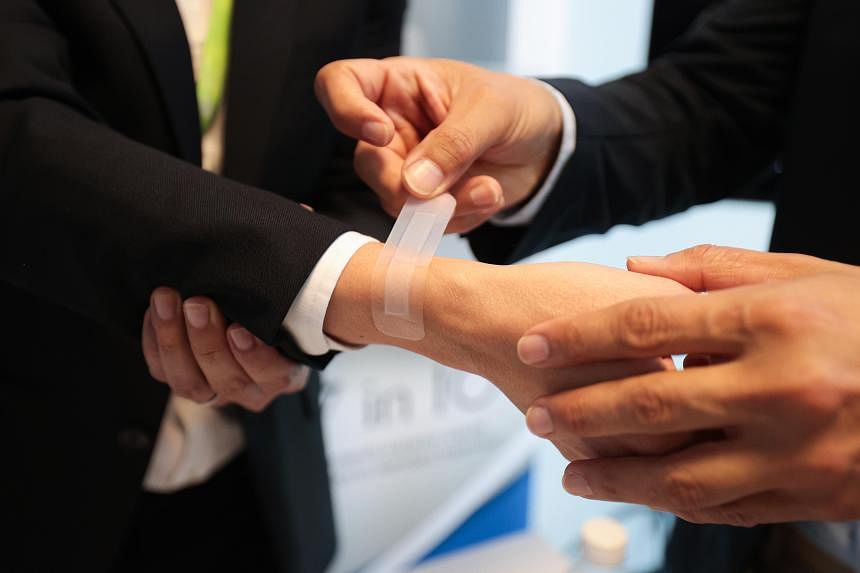SINGAPORE – Local firm RNAscence Biotech has developed a first-of-its-kind skin patch that reduces the appearance of scars. The patch, which looks like a plaster, has been used by plastic surgeons and dermatologists and is now available for public sale.
A clinical trial involving patients who underwent skin operations showed that post-surgical scars were 84 per cent smaller after 60 days of applying the patch for at least 12 hours every day, said Associate Professor Tey Hong Liang, who is part of the team that developed the patch.
Scar volumes were also 30 per cent lower, compared with scars treated with silicone patches, which is the current standard treatment.
Prof Tey, who is the clinical director at the National Healthcare Group’s (NHG) Centre for Medical Technologies and Innovations and the co-director of the Skin Research Programme at Nanyang Technological University’s (NTU) Lee Kong Chian School of Medicine, said the patch works by delivering RNA-based active nanoparticles into the skin through bio-dissolvable microneedles.
No drugs are involved, so it is safe and free of side effects that may accompany drug use. “It reduces very specifically that scar tissue and nothing else,” he added.
The firm, a spin-off company from NTU and the National Skin Centre, is now marketing the product in Singapore and overseas.
It has priced its Renectin Antiscar at around $150 to $176 for a box of seven patches, depending on the volume purchased.
It also aims to take the research into RNA-based active nanoparticles further. Next up is using the technology in a skin patch or cream to target eczema, he said.
RNAscence Biotech is one of seven start-ups that have benefited from the $15 million biomedical technology incubator co11ab Novena, which was launched by Senior Minister of State for Health Janil Puthucheary on Tuesday.
Co11ab was set up by NTU, the Agency for Science, Technology and Research (A*Star) and NHG to help biomedtech start-ups make the leap from research and development to commercialisation.
Sited at the Lee Kong Chian School of Medicine campus, co11ab is the first biomedtech incubator in Singapore to be embedded in a healthcare precinct, within easy reach of hospitals, national speciality healthcare centres and research institutions. This allows the start-ups to tap the clinical and research expertise there.
“Co11ab will help bridge research, clinical and venture creation activities by establishing itself as a national innovation and translational hub for bettering the health of the population,” said Dr Janil.
The start-ups at co11ab are at various stages of product development.
Occutrack, a spin-off from A*Star, NHG and Trendlines Medical Singapore, is collaborating with the NHG Eye Institute to develop a prototype eye movement tracking system to manage the visual deterioration of those with diseases such as age-related macular degeneration, which is a major cause of blindness in those over 50.
There is also LambdaGen Therapeutics, which aims to provide off-the-shelf immunotherapies derived from stem cells. FormaCyte Therapeutics, meanwhile, has developed a cellular “implant” made up of insulin-secreting cells for effective diabetes management. And HeHealth has an artificial intelligence platform that can help a man detect if he has a sexually transmitted disease.
The start-ups rent a space at co11ab, which partners with national agencies, international industry players, trade associations and institutions to curate workshops and networking sessions to help the start-ups attract potential funders.
One of them, Coronet Ventures, plans to invest in 12 to 15 early-stage healthcare and biomedical science start-ups in Singapore over the next five years, providing funding ranging between US$100,000 (S$135,760) and US$3 million for each start-up.
Coronet Ventures is a Singapore-based venture unit by Cedars-Sinai Intellectual Property Company, the innovation arm of US hospital operator Cedars-Sinai Medical Centre.
“The best research cannot change patients’ lives if there is no product or service. We need successful companies to develop, validate, manufacture and sell such products before they can enter the clinic,” said Professor Benjamin Seet, who is deputy group chief executive for education and research at NHG.
“Accelerators are not uncommon. What’s special here is the partnership model.”
SGX to amend life sciences listing rules to make revenue exemption explicit
Join ST’s WhatsApp Channel and get the latest news and must-reads.
p.st_telegram_boilerplate:before {
display: inline-block;
content: ” “;
border-radius: 6px;
height: 6px;
width: 6px;
background-color: #12239a;
margin-left: 0px;
margin-right: 13px;
}
a.st_boilerplate {
font-family: “SelaneWebSTForty”, Georgia, “Times New Roman”, Times, serif;
}


